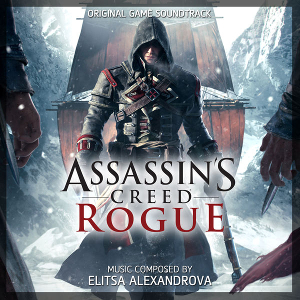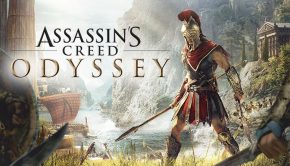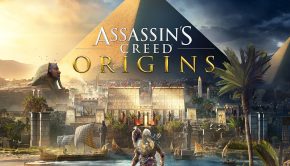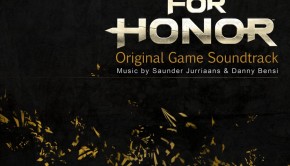Assassin’s Creed -Rogue- Original Game Soundtrack
 |
Album Title: Assassin’s Creed -Rogue- Original Game Soundtrack |
| Record Label: Ubisoft |
|
| Catalog No.: N/A |
|
| Release Date: November 11, 2014 |
|
| Purchase: Download at iTunes |
Overview
Assassin’s Creed: Rogue was released alongside Assassin’s Creed: Unity at the end of 2014, each game designed for a different generation of console. Rogue has been met so far with better reviews, or at least less notoriety, than its counterpart. The composer of Rogue, Elitsa Alexandrova, is an in-house sound designer and musician for Ubisoft Bulgaria. The 51-minute soundtrack was released though digital stores on the game’s release day. A slightly-modified version, omitting the bonus trailer theme in the digital version, was available with the collector’s edition of the score.
Body
I have to start with addressing the biggest issue with the Rogue soundtrack, as it affects all but one of the tracks: namely, the songs are all too short. Only six out of the 31 songs are over two minutes in length, and only one of those songs is over 2:30. Many tracks end just under a minute in length, resulting in what sounds like a really stimulating introduction to what promises to be a stand-out composition, but result in only about fifty seconds of build-up before the piece abruptly ends. What makes this issue particularly frustrating is that the compositional quality isn’t low. On the contrary, it’s varied in terms of both instrumentation and dynamic, tempo and mood, throughout the entire album. However, two minutes simply isn’t nearly long enough for any significant development to take place, and because that tends to be the maximum average length for the majority of the tracks, the unsatisfying result is an album of music that never really seems to build, conclude, or really move at all.
Although the track length does significantly increase the difficulty in layering themes into the score, one move that Alexandrova made that helped the issue was to include themes from previous Assassin’s Creed games. The soundtrack to Rogue is surprisingly filled with snippets of motifs from from Black Flag all the way back to the iconic Assassin’s Creed II. “Assassin’s Creed Rogue Main Theme” begins with such a mixture of themes, opening with a gentle rendition of “Rooftops of Venice” mixed with “Earth,” both popular tracks from Ezio’s saga. Both of these themes show up several times throughout Rogue, either in part or in whole. Mostly, Alexandrova throws in snippets, just two or three notes, from the older game. As the game itself is the final puzzle piece to the storylines of both Black Flag and Assassin’s Creed III, this kind of return to normalcy is a smart one, particularly alongside the rough patches Ubisoft is going through with Unity. “Main Theme” uses a beautiful, soaring violin to resurrect the “Earth” melody, and the piece culminates with a short, pizzicato waltz.
One smaller problem that resulted from Alexandrova’s choice in theme, though, was the unfortunate lack of identity within the score. The arrangement of “Rooftops of Venice” is a wonderful one, and the throwback to the earlier game is great (it’s actually one of my favorite themes in the series); however, after the first track, I am really left with nothing to go on as to what the theme of Rogue is. The second track “Animus Black” is too ambient to detect any type of motif at all, so it isn’t until “Morrigan” that I have truly original music. The Morrigan is the ship that the player captures in the first five minutes of the game, and serves as the player’s ship — similar to Black Flag‘s Jackdaw. The music is tense and stirring, bleeding quickly into the following track, “Conqueror” which has a less choppy and more rolling rhythm, supported by grace notes and mixed meters. The two pieces cumulatively clock in under three minutes, but the latter ends with something akin to a theme, played on bright horns, just before the piece cuts off.
“Cutlass” introduces a new style of music in the track that begins bringing some of the Black Flag music back in — in other words, the soundtrack begins to sound piratey. An anonymous soprano woodwind instruments hits three notes of the Black Flag theme, but fades away quickly to a constant, stirring bass brass-and-percussion ostinato. The first track where I get a real sense of movement is “The Guardian,” which opens with a harsh, tinny set of instruments beating out an accented rhythm. As with most of the previous pieces, an string instrument quickly begins an upbeat melody, but the chords change differently in this piece, at least enough that the piece has the beginnings of an original melody – enough of one that I could get it stuck in my head, or hum along a little. Although the piece is still very repetitive, it has more content in it than many of the other tracks in the score. “Run, Shay! Run!” has an even stronger melody, played on a duet of individual strings over the harsh percussion from earlier, and comes across beautifully, although the melody is, as usual, a short one.
Several of the pieces take a bass approach, spotlighting bass percussion, bass strings, and bass brass. “Prelude to a Storm” is a strong track despite its short length, performed almost entirely in the low strings, brass, and percussion. The brass balances the track, playing whole notes every other measure to create a back-and-forth feel with the higher-pitched percussion. The track is one of the shorter ones of the score, but it’s not the only one of its style. “David and Goliath” uses a similar technique to alternate low brass and high strings, even bringing in bells to create a stately, militant feel. The brass rises through a chord progression consisting of triads, sevenths, and unintelligible dissonance in an enjoyable crescendo, and is met with a descending high-string pattern. The balance and symmetry of the piece make it an extremely satisfying listen, particularly for those who enjoy harsher and lower instrumentation.
I was very interested to see a period piece Alexandrova wrote for the score, “Alemanda in F# Minor,” which features a harpsichord and a violin. Along with Unity, I had been pretty curious to see if this game incorporated any music reflective of the time period, but this was the only one present in Rogue, and it unfortunately lasts less than fifty seconds. “Agnus Dei” is another period piece, featuring a solo tenor a cappella, followed by a high-register organ and a delicate female choir. The piece is beautiful, and offsets the rough pirate feel of the rest of the score. “Northern Lights” is another piece that, while having far less to do with the time period, does shift the focus of the score from pirates to something more ethereal. Alexandrova takes a series of high-pitched percussion instruments, sounding like a cross between theremin and wine glass rims, to create an altogether eerie and angelic effect — very striking in this melody-and-bass-centered score.
Summary
Rogue certainly has moments of musical talent and diversity, but the lack of track length and thematic content make the overall score somewhat lacking. Had Rogue even had its own theme, it would have been a substantial score, and an extremely enjoyable one at that. Alexandrova is a talented composer; with the inclusion of one or two cohesive elements lacing the score, the score becomes not only successful, but fun, lively, and engrossing. As it is, there are tracks with fun or charming moments, but the score is simply does not have enough of an identity to be entirely successful.
Do you agree with the review and score? Let us know in the comments below!
3
Posted on December 9, 2014 by Emily McMillan. Last modified on December 9, 2014.














